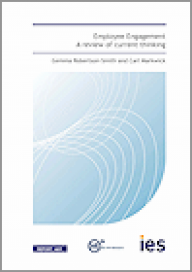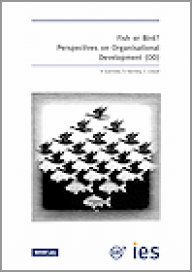Publications
 We author and publish a range of resources to keep you up to date with the latest developments in employment, labour market and human resource policy and practice.
We author and publish a range of resources to keep you up to date with the latest developments in employment, labour market and human resource policy and practice.
All our pdf publications are free to access.
-
📄
Learning to be Healthier
The role of continued education and training in tackling health inequalities
Hillage J, Savage J, Lucy D | Jun 2009 | University College LondonThis paper concentrates on adults and their participation in learning activities from formal work-based qualifications to informal community-based activities. This paper helped inform the first phase of the Strategic Review of Health Inequalities in England Post 2010 (Marmot Review).
-

Evaluation of the Advanced Practitioner Roles
Miller L, Cox A, Williams J | Jun 2009 | Institute for Employment StudiesIn February 2008 Skills for Health, in partnership with NHS West Midlands, commissioned a national evaluation of five Advanced Practitioner roles introduced under the New Practitioner Programme. The research involved a review to identify appropriate measures to use in the evaluation; a survey of sites at which Advanced Practitioners were employed and, for comparison, a similar survey of sites without these roles; and case studies of implementation sites.
-

Activity and Learning Agreement Pilots - Programme Theory Evaluation (Working Paper 4)
Learning Agreement Provision
Page R, Johnson C, Munro M | Jun 2009 | Department for Children, Schools and FamiliesThe Learning Agreements Pilots (LAP) were launched in April 2006 in eight areas of England to run for two years. LAP was an initiative targeted at young people aged 16 to 17 who were working but not engaged in any accredited training, ie in jobs without training (JWT). The objectives of the evaluation were to test the effectiveness of the LAP approach for re-engagement; monitor and understand how LAP were managed and implemented and to highlight good practice, and understand what worked (or not) within the pilots - to understand how young people responded to the initiatives, agreements and brokerage and to understand for whom, and in what circumstances the theories behind the programme had worked.
-

Activity and Learning Agreement Pilots - Programme Theory Evaluation (Working Paper 6)
Learning Agreement Small Step Progression
Levesley T, Fearn H, Oakley J | Jun 2009 | Department for Children, Schools and FamiliesThe Learning Agreements Pilots (LAP) were launched in April 2006 in eight areas of England to run for two years. LAP was an initiative targeted at young people aged 16 to 17 who were working but not engaged in any accredited training, ie in jobs without training (JWT). The objectives of the evaluation were to test the effectiveness of the LAP approach for re-engagement; monitor and understand how LAP were managed and implemented and to highlight good practice, and understand what worked (or not) within the pilots - to understand how young people responded to the initiatives, agreements and brokerage and to understand for whom, and in what circumstances the theories behind the programme had worked.
-

Employee Engagement: A review of current thinking
Robertson-Smith G, Markwick C | May 2009 | Institute for Employment StudiesThis report brings clarity to the debate. Based on a systematic review of the literature on employee engagement and synthesising current thinking and evidence.
-

Fish or Bird? Perspectives on Organisational Development (OD)
Garrow V, Varney S, Lloyd C | May 2009 | Institute for Employment StudiesThis report offers a contemporary look at Organisational Development (OD) practice from multiple perspectives. It considers the legacy of classical OD and the transition to a post-modern field of practice. Through practitioner and senior executive interviews, the research examines provider and customer perspectives and the implications for OD career development. There is also a very personal perspective with insights into the authors’ own careers.
-

LPC 2008 Survey of Employers
Apprentice Exemptions
Denvir A, Pearmain D, Cox A | May 2009 | Institute for Employment StudiesThis is a qualitative study of a small sample of employers to explore in detail their perspectives on apprenticeships. The report gathers views on issues such as: reasons for participation, current pay practices, the impact of the National Minimum Wage exemptions on employing apprentices, and likely impacts of various changes to the exemptions.
-

Train to Gain Learner Evaluation: Report from Wave 4 Research
Levesley T, Regan J, Hillage J | May 2009 | Learning and Skills CouncilTrain to Gain was designed as a national service for businesses that helped to identify and source training that would improve their business performance and the skills of their workforce. It aimed to encourage employers to invest in the development of the skills and qualifications of their employees. This report documents the findings from the fourth wave of the learner evaluation of Train to Gain. The evaluation took place over two years, from 2007 to 2009.
-
📄
Annual Small Business Survey 2007/8
Williams M, Cowling M | Apr 2009 | Department for Business, Enterprise and Regulatory ReformThis report presents findings from the Annual Small Business Survey (ASBS) 2007/08. The survey interviewed 7,783 UK Small and Medium-sized Enterprises (SMEs) with between 1 and 249 employees between December 2007 and February 2008.
-

Career Paths of Chief Executives - Personal journeys and reflections
Barber L | Apr 2009 | NHS Yorkshire and the HumberIES was commissioned to undertake research into how chief executives in the Yorkshire and Humber region had made it to the top in the NHS. This document presents pen pictures of 21 chief executives in the region. This publication is no longer available.
